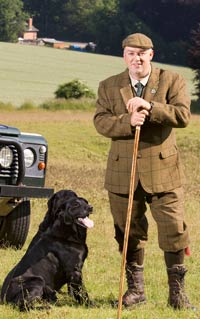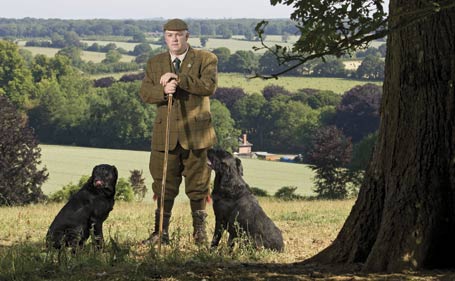Hampshire gamekeeper makes shortlist

The three finalists of the Farmers Weekly/CLA Game Fair Gamekeeper of the Year Award 2009 will be featured in the coming weeks, with the winner announced on 24 July. Tessa Gates meets the first
You could say that gamekeeper Michael Hall was born for the job. He is the third generation of his family to be involved in gamekeeping and has close ties to Brockwood Estate, Hampshire, where he has been keeper for seven years.
Brockwood, 10 miles east of Winchester, has been owned by the Morton family for more than 40 years. The estate is mixed arable farmland with sheep on the permanent grass park. Roses, herbs and flowers are grown for its diversification – The Real Flower Company – and there are 300 acres of ancient woodland.
Michael took over as single-handed keeper on the 1200-acre pheasant and partridge shoot in 2002. “My father was keeper here from 1987 and when he retired I was offered the job,” he explains. “My father, grandfather and great grandfather were all born within a mile of here and I started beating on the shoot when I was 11. I knew I wanted to be a gamekeeper from the age of seven.
“I was brought up among older people who knew this farm and the woods, they had the knowledge to pass on,” he says. In turn, he tries to pass his knowledge on by encouraging youngsters to come beating and managing father-and-son shoots, where they can learn the art and etiquette of shooting.

Now 40, and married with two children, Michael is a fascinating mix of modern keeper, keen to encourage wildlife and embrace change, and old wisdom. He is also superstitious. “I don’t shoot rooks – it’s bad luck. I believe if you clear the rooks off an estate, the money goes with them,” says Michael.
Brockwood is a beautiful place with many specimen trees. “My father came here in 1968 and he loved shooting,” says Dr Roderick Morton, who nominated Michael for the award. “With four sons, there was always a suitable level of competitiveness in the family shoot.”
Today, Dr Morton, and his three brothers and a new generation of four boys and two girls, still love their shooting and look for quality birds. “As a family, 150 birds maximum is what we like – as long as I get a bird to remember, it makes me happy,” he says. While mainly a family shoot with a total of 16 days, there has always been a few let days, mainly to local people.
“Today a full-time keeper for a family shoot isn’t viable, so we have increased the let days to seven or eight and have forestry and hedging input from Michael, too. He has extensive forestry skills,” says Dr Morton.
Guns vary from experienced teams able to handle high swinging pheasant to those who shoot only once or twice a year or are novices. Michael manages this challenge well. He can pick from 24 drives to suit the guns. Expected bags vary from 225 on let days down to 40 on youngsters and friends days.
He no longer rears his own birds. “We had two or three bad summers and the equipment was tired so we thought we would let the experts take the strain. We now get our poults in mid-July from Hampshire game farmer Pat Robins. They are not big birds but they turn wonderfully,” says Michael.
He releases a modest number of pheasant and French partridge and returns 55%. “I had 65% one year,” he recalls. “Lots of pairs of partridge over-winter.”
He is not afraid to experiment. The rolling landscape of the South Downs is not noted for high birds, but Michael can test the best shots on some of his drives. “I like to send birds out of the woods and I like birds that curve,” he says.
One new drive proved particularly challenging. Experienced guns got 18 birds for 180 shots and at the end a big cheer went up for an enjoyable day. “We haven’t got the hills but we make the best of what we’ve got,” he says.
His forestry and hedging duties have also had an impact on the estate. He has revived old hazel coppices, laid old hedges and created new ones. Shrub and tree planting has warmed and rejuvenated the woods. He has created a mosaic of clearings and, in other places, left fallen trees to benefit wildlife.
There are plenty of cover crops for game and wild flower strips. An RSPB survey found 45 species of birds at Brockwood, including four with red status. “It didn’t spot our ravens, although there is a pair here,” Michael confides. “Golden plover visit every year and I have seen two curlew. I think red kites are nesting – I feed them hoping they will leave my birds alone. The Old Man’s Beard (wild clematis) is full of mice nests and we have lots of barn owls and plenty of bats.”
But, over the years, he has felt that one thing was missing from Brockwood – water. “I asked if we could create two ponds. We tried to do it ourselves and puddled them with clay, but they would not hold water. Then I found out you can get clay in a roll and lay it like carpet,” says Michael. “It solved the leak problem. As soon as the first one was filled it was attracting dragon flies and all sorts.”
The ponds were thick with frogspawn this spring and attract duck, including teal and mandarin. “They’re not really for flighting, although the odd brace may be shot for the table; they are here for the wildlife,” says Michael, who delights in the diversity of nature at Brockwood.

